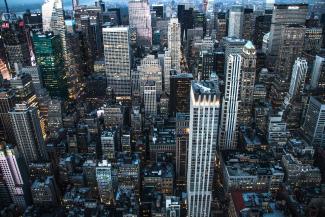
Conflicting Signals
By Mark Wendell
From the peaks of mountain tops to the depths of barren valleys and back up to the top again all in one year, Wall Street has been a confusing volatile enigma and, seemingly, a constant contradiction this year. Why? Usually stock prices represent the proverbial canary in a coal mine. They tend to be forward forecasting of corporate profits and losses. Therefore, it makes sense that investors gain perspective now by looking into the future and not be deterred by the virus fears, media drama, and election confusion. Rather, they should focus on the soon-to-be recharged economy, reenergized corporate profits, and higher portfolio values.
Why, then, have stock market major indices regained their values but the economy in aggregate has not recovered overall, with only a few notable sectors excepted from the downturn? “The stock market is not the economy”—is the often-stated cliché answer. What this statement says is that there are millions of individuals and businesses in every corner of this country either hanging on by a thread or that have already sunk into oblivion. In a capitalistic economy, it is simply money freely flowing to its highest and best use—government unimpeded, with competition, profits, and losses—that allows the system in our country to flourish. A shutdown economy due to the pandemic is a hammer and sickle to the USA’s capitalistic system, mucking up our mostly well-oiled, evolving, healthy economic system. History shows that it is the human element of capitalism, something freely given—labor for currency—in exchange for something received—products and services—known as trade that is the not-so-well-kept secret to a thriving capitalistic economy, higher standards of living, and a happy and healthy country. It seems that only the few businesses and individuals that were able to sustain themselves, somewhat normally, were those that operated mostly via the internet, that did not require much or any human contact, and that were well prepared to weather the downturn storms of 2020. This infamous year will be known as the anti-capitalism – anti-democratic year, the year that lacked the human factor in capitalism, a year that hoisted more government, more divisive and controversial media, more derisive politics, and more imposed health restrictions upon our daily routines, ironically choking the life out of the very free, democratic, capitalistic system we know and love.
Technology is so integrated into our lives that a near collapse of the economy was the extenuating factor that brought out its vital importance to our capitalistic economic system, and as well, the near catastrophe revealed the vital human element of our mostly service-based economy. The services sector represents about 70% of the USA economy. In the investment world, about 39% of the S&P index is categorized as technology companies. Yet the technology sector of the GDP in the USA represents only about 7%. This contradiction in numbers exposes the real reason high market values do not make much sense today but they make all the sense in the world if we look back to the future when the two major issues of the day have resolved—the election and the virus.
Another vital reason Wall Street has confidence today is that the Federal Reserve’s monetary policy intervention has engendered confidence by supporting asset values, maintaining low interest rates, and promoting actions that help bring down unemployment rates. Additionally, Congress’s fiscal policy of adding stimulus certainly adds to consumer confidence and therefore assists with overall efforts to support an economic recovery.
While financial markets are inherently unpredictable, there are logical reasons in our sickly capitalistic economy today that market and investment confidence is the word of the day and that policy makers will do their level best to invoke consumer confidence, consumer spending, and promote a thriving economic recovery quickly.

